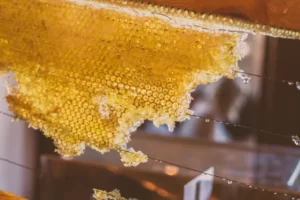Table of Contents
Manuka Honey for Dogs
Introduction
In this article, we will discuss the benefits and safety of feeding Manuka honey to dogs. Manuka honey is a powerful antioxidant with anti-inflammatory and antibacterial properties that can provide numerous health benefits to our canine friends. We will explore the nutritional value of honey, how much honey is safe for dogs to consume, and the different types of honey that are safe for them. Additionally, we will provide a delicious banana and honey dog treat recipe that you can try at home. But first, let’s answer the question, “Is honey safe for dogs?”
Is Honey Safe For Dogs?
Yes! Honey is not only safe for dogs, but it can also be beneficial for them. It is a natural sweetener that contains valuable compounds such as antioxidants that can promote good health in dogs. Additionally, honey has been used in clinical settings to treat wounds and protect the skin of dogs. While studies on the long-term benefits of adding honey to a dog’s diet are limited, it is generally safe to give them a small amount of honey.
Nutritional Value of Honey
Honey is mostly sugar and is not particularly nutritionally dense. However, it does contain antioxidants that can enhance wound healing, reduce allergy symptoms, boost energy levels, and soothe gastrointestinal distress in dogs. While honey should not be the primary source of nutrition for dogs, it can be a beneficial addition to their diet.
How Much Honey Can Dogs Have?
The amount of honey that is safe for dogs to consume depends on their size. Here is a guideline:
- Dogs weighing less than 10 lbs can have ¼ tsp of honey per day.
- Dogs weighing between 10-20 lbs can have ½ tsp of honey per day.
- Dogs weighing between 20-50 lbs can have ½ – 1 tsp of honey per day.
- Dogs weighing between 50-75 lbs can have 1 – 1 ½ tsp of honey per day.
- Dogs weighing 75 lbs or more can have 1 ½ – 2 tsp of honey per day.
It is important to note that not all dogs can safely consume honey. Dogs with diabetes, compromised immune systems, or underlying medical conditions should not be given honey without consulting a veterinarian. Additionally, puppies under one year old should not be fed honey due to the risk of botulism spores.
Common Types of Honey
There are different types of honey available in the market, and not all of them are safe for dogs to consume. Here are some common types of honey and their safety for dogs:
- Clover Honey: Yes, in moderation. Made by bees that collect nectar exclusively from clover flowers.
- Comb Honey: Yes, in very small quantities. Honey that has not been extracted from the waxy comb.
- Creamed Honey: Yes, in moderation. Honey that has been processed to create a creamy, spreadable texture.
- Hemp Honey: Yes, follow dosing instructions. Honey infused with cannabinoids and beneficial compounds from the hemp plant.
- Hot Honey: No. Can cause gastrointestinal upset, vomiting, diarrhea, and discomfort. Contains capsaicin from chili peppers.
- Manuka Honey: Yes, in moderation. Made by bees that collect nectar exclusively from Manuka trees. Considered especially healthy and beneficial.
- Raw Honey: Yes, in moderation. Honey that has only been extracted from the comb and strained with no additional processing.
- Unfiltered Honey: Yes, in moderation. Honey that has only been extracted from the comb with no additional processing.
- Wildflower Honey: Yes, in moderation. Made by bees that collect nectar exclusively from mixed wildflower varieties.
Banana & Honey Dog Treat Recipe
Here is a delicious dog treat recipe that incorporates honey and banana as the key flavors:
Ingredients:
- 2 cups of water
- 2 medium bananas, mashed
- 1 egg
- 2 tbsp honey of your choice
- 1 tsp vanilla extract (optional)
- 1 tsp baking powder
- 4 ½ cups whole wheat flour + more for dusting
Instructions:
- Preheat the oven to 350 degrees Fahrenheit and line two baking sheets with parchment paper.
- In the bowl of a stand mixer, combine water, mashed bananas, egg, honey, and vanilla extract. Mix thoroughly on a medium setting.
- Add baking powder to the mixture and mix to combine.
- Gradually add the whole wheat flour, ½ cup at a time, mixing well after each addition until a rough, slightly sticky dough forms.
- Dust a clean surface lightly with flour and transfer the dough onto it. Knead the dough for about 6-8 minutes until it is no longer sticky. Add more flour as needed.
- Roll the dough into a ¼-inch thick rectangle and cut it into shapes using cookie cutters.
- Place the cut dough pieces onto the prepared baking sheets and bake for about 20 minutes or until golden brown. The cooking time may vary depending on the size of your cookie cutters.
- Turn off the oven but leave the treats inside to dry and become crispy for 30-40 minutes.
- Remove the treats from the oven and let them cool on the baking trays for 10 minutes before transferring them to wire racks to cool completely.
Can Dogs Have Honey? FAQ
Can honey be toxic to dogs?
No, honey is not toxic to dogs. However, feeding them too much honey can cause vomiting, diarrhea, elevated glucose levels, and an upset stomach.
Can dogs have raw honey?
Yes, dogs can have raw honey. It is safe for them to consume in moderation.
What should I do if my dog licks some honey?
If your dog licks a small amount of honey, there is no need to worry. They will be completely fine as long as they did not consume a large amount.
What are the benefits of honey for dogs?
Honey can offer several benefits to dogs when regularly added to their diet. It has anti-inflammatory properties, can reduce allergy symptoms, and promote wound healing.
Can I give my dog honey for a cough?
While honey may provide some temporary relief for a dog’s cough, it is not a proper treatment for the underlying cause. If your dog is coughing, it is best to consult with a veterinarian for the appropriate course of action.
What is topical honey?
Topical honey products are used to treat external wounds, irritation, and rashes in dogs. Many skincare products for dogs contain honey as a key ingredient. There are also specific varieties of honey sold specifically for topical use.
In conclusion, Manuka honey can be safely consumed by dogs in moderation. It can provide several health benefits, including anti-inflammatory and antibacterial properties. When feeding honey to dogs, it is important to consider their size and consult a veterinarian if they have any underlying health conditions. By incorporating honey into their diet and using it topically, dogs can enjoy its numerous advantages. Try the banana and honey dog treat recipe provided in this article for a delicious and healthy snack for your furry friend.



